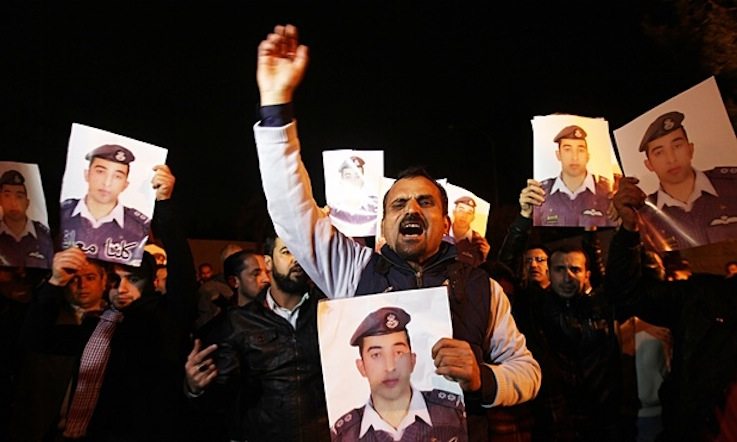Recent polling results suggest that King Abdullah’s low-profile policy toward Syria is well calculated to keep him out of trouble.
As the international spillover from Syria’s crisis escalates, its neighbors look on with wary concern. A new public opinion poll in neighboring Jordan — which already hosts both a million Syrian refugees and a U.S. program supporting the Syrian opposition — sheds harsh light on local views of this and other raging regional conflicts.
The poll was conducted in late August through early September by a leading Arab commercial survey firm. It is based on personal interviews with a random, geographic probability national sample of 1,000 Jordanian adult respondents. The sample is fully representative of the overall population: 98 percent Muslim, 61 percent with less than a high school diploma, 55 percent in the 18 to 34 age cohort. The statistical margin of error is approximately plus or minus 3.5 percent.
ASSAD, RUSSIA, HEZBOLLAH ALL VIEWED VERY NEGATIVELY, ALONG WITH ISIS
Jordanians see no “good guys” in Syria today: the Syrian regime, its outside supporters, and its main internal enemy all receive highly unfavorable ratings. Asked their view of each player “considering their recent policies,” Jordanians rated Syria’s government at 91 percent “fairly negative” or “very negative.” The Syrian government’s allies — Russia and Hezbollah — also get very bad reviews: the two are tied, each receiving an 86 percent negative rating. But Jordanians view these Syrian players’ common enemy, ISIS, even more poorly: the group is rated 89 percent “very negative,” with an additional 3 percent “fairly negative” score.
IRAN ALSO CONSIDERED A MAJOR PROBLEM
Similarly, when asked about Iran’s recent policies, Jordanians overwhelmingly characterize them very negatively (50 percent) or fairly negatively (43 percent). The recent P 5+1 nuclear deal with Iran is also seen as problematic: just one-third of those polled classified the agreement as a good deal, compared with the plurality (45 percent), who call it bad; one-fifth say they don’t know enough to judge.
Looking ahead, only 13 percent of Jordanians expect Arab-Iranian relations to improve; a narrow majority (53 percent) say those relations will get worse, while 29 percent predict they will remain about the same. More unexpectedly, given a list of six regional conflicts including Syria, Yemen, Israel-Palestine, and ISIS, a plurality of Jordanians say top priority should be either “the conflict between Iran and Arab countries” (15 percent) or “the conflict between sects or movements of Islam” (13 percent).
ONLY A SMALL MINORITY SEEKS MILITARY INTERVENTION IN SYRIA
From a list of six options for Jordan’s policy toward the Syrian crisis, a mere 7 percent pick “assist the opposition, including our own direct military intervention.” An additional 22 percent favor assistance to the Syrian opposition, but “not with our own direct military intervention.” And just 9 percent say Jordan should “accept Turkish military intervention to stabilize the situation in Syria.”
In comparison to these interventionist options, it is striking how many Jordanians favor a less activist policy. A solid majority say that their country should either “support UN and other diplomatic efforts for a cease-fire and political settlement” in Syria (29 percent) — or even “stay out of the Syrian conflict completely” (28 percent).
TOP REQUESTS FOR THE UNITED STATES
Given five options for their most desired action from the United States, Jordanians are most inclined to opt for “more economic or technological assistance,” with 35 percent picking this option as their first choice and 33 percent as their second choice. The second most listed choice is “more weapons and training for Arab countries to defend themselves.” Only in third place is “more diplomatic support to solve regional conflicts.”
Surprisingly, “more opportunities to study, travel, or live in America” comes last, with just 13 percent choosing this option as their top priority. Even more surprising is that a mere 3 percent say they want “none of the above” from the United States — although the large majority have either a fairly negative (33 percent) or very negative (52 percent) view of recent U.S. policies.
POLICY IMPLICATIONS
These findings suggest that, when weighing risks to Jordan’s stability, it is unlikely that either ISIS or Iran and its allies could gain enough popular support to cause serious unrest. Moreover, King Abdullah’s low-profile policy toward Syria seems well calculated to keep him out of trouble.
On the other hand, outside pressure to increase Jordan’s role in Syria would probably be so unpopular that it might create a significant social backlash. Instead, Jordan’s public would be much more receptive to increased U.S. economic and military support — with the aim of keeping Jordan insulated from rather than more involved in the conflicts raging just across its borders.
******************************
David Pollock is the Kaufman Fellow at The Washington Institute and director of Fikra Forum.

